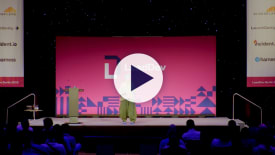
Latest videos
-

Journeys in diversity – what difference really means
Discover what true inclusion means by exploring practical ways to support neurodivergent colleagues and create genuinely diverse teams.
-

Scaling systems, scaling influence: Lessons from distributed architecture
Scaling systems and scaling influence share the same principles. Learn how distributed systems thinking can help you become a more effective technical leader at scale.
-
 In partnership with Fastly
In partnership with FastlyThe silent infrastructure crisis: AI bots and the future of web performance
A technical deep dive into AI bot traffic’s infrastructure, security, and performance impacts, backed by Fastly’s large-scale 2025 analysis.
-
 In partnership with Augment Code
In partnership with Augment CodeHow Collectors learnt to assess AI coding tools
Watch CTO Dan Van Tran break down how they assess – and improve – a variety of AI coding tools
-
 In partnership with Harness
In partnership with HarnessTake the fear out of vibe coding
How to use tried and tested tools and techniques to safely enable engineers to vibe code.
-
 In partnership with Augment Code
In partnership with Augment CodeHow Tilt’s Review Bot transformed its code reviews
Watch James Garrett build a comprehensive knowledge base alongside a rigorous testing process, allowing before/after PR comparisons for any rule changes.
-
 In partnership with Honeycomb
In partnership with HoneycombHow to understand the value of your code
Using observability tools to code with your eyes open.
Highlights from our conferences

Measure for Change
Picking metrics is one thing. But the harder decisions lie in what to do with them afterward.
View all videos from LeadDev London

Drive product gaps as an engineering leader
Discover practical strategies for engineering leaders to influence product development effectively, even in the absence of strong product management and a clear company vision.
view all videos from LeadDev NEW YORK

Growth in a downturn
In this talk, Smruti Patel asks, if hyper-growth is marked by spending more to make more, what does building for enduring growth look like?
view all videos from LeadDev berlin

Idea to Innovation
Join me as we embark on a journey to dissect the anatomy of innovation, uncover strategies to unlock the full potential of ideas, and transform them into impactful realities. Let’s build a strong culture of innovation, and make sure that it is not just a buzzword but a tangible outcome.
view all videos from staffplus london

Slack enterprise key management: Senior to staff lessons
Explore the key lessons and skills Audrei gained during their first Staff+ project, Slack Enterprise Key Management. This talk offers insights for anyone growing in their Staff+ career.
view all videos from staffplus NEW YORK
All videos
-

Ways your teams can (realistically) prioritize code quality
Code matters – learn how to create a culture of quality in your organisation
-

Enabling your engineers to run great interviews
Inconsistent interviewing standards can lead to wrong hiring decisions and costly mistakes
-

Five investments for a sustainable, high-performing team
How to build a healthy, self-sustaining ecosystem within your team that produces high-performing results.
-
Strengthening company alignment
As a senior leader, you are often the in-between person who is matching the business needs, product execution and the team’s talent. That work requires you to communicate proficiently to ensure everyone understands the needs and the status of progress. In this talk, we’ll cover the basic communication paths to be successful as a senior engineering leader and dive into two of the most difficult parts of it: forward planning and driving accountability in your teams.
-

Optimizing the time you and your team spend on hiring
Hiring engineers is intensive, so how can you streamline the hiring process and tap into top talent?
-
Common mistakes new staff engineers make… and how to avoid them
Understand how to navigate uncertainty and new challenges as a new staff engineer
-

Effective methods for developing peers and levelling up your mentorship skills
Coaching and mentoring play a crucial role in developing your peers’ potential
-

Career vectors for technical leaders
Mix and match skills to become the best technical leader that you can be.
-

Switch up how you manage up
Every senior leader you interact with will bring their own experience, set of biases, communication styles – and fundamentally, different personalities to a conversation. Lara Hogan explains how to adapt your tactics to different management techniques.
-

Unravelling the misconceptions of managing up
Senior Director of Engineering at Github Neha Batra unravels the misconceptions of managing up at LeadDev Together.
-

Managing compassionately through underperformance
You’ve identified that a person is underperforming. What comes next?
-

Managing performance with clarity and empathy
How to write and communicate clear expectations and gain the confidence to address underperformance.
-

Turning conflict into empathy on engineering teams
How to create a safe space for open communication.
-

Communicating change: leading through the change curve
How to tailor your communications based on how your employees are experiencing and reacting to the change.
-

Creating the foundation for difficult conversations
How to build and cultivate trust as the foundation for difficult conversations.
-

Capability, Vulnerability, Fallibility, and Flexibility: A Permission System for Trust
Anjuan Simmons at LeadDev Together 2022
-

Their career: sponsored by you!
Strategies to move from an advisor to an investor in your reports’ careers
-

Other people’s problems: a primer on coaching
The world’s best leaders seem to have one thing in common, and it has nothing to do with their intellect or their broad experience.





